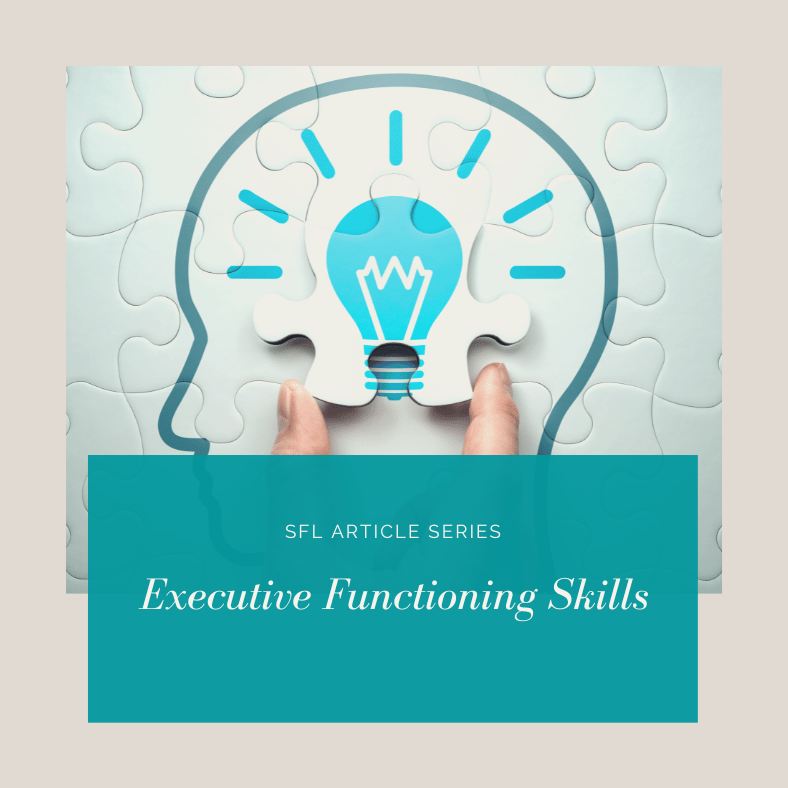No products in the cart.

Executive Functioning Skills, most simply put, refers to a set of cognitive skills needed to complete a task or solve a problem. They are essential for success in academics and beyond. Here are some of the key executive functioning skills, their functions, and some common challenges associated with them. We’ll also include tips and strategies to help improve executive functioning skills your child or teen may be struggling with.

Cognitive flexibility is the ability to shift thinking and adapt your response to changing demands. It is arguably considered one of the most important EF skills. Students who struggle with cognitive flexibility have difficulty trying new things, implementing a new or unfamiliar strategy, or taking risks in their learning. Learn more about how to help your child or teen improve their cognitive flexibility.

Response inhibition is the ability to think before acting. It is the skill we need to resist immediate and automatic responses to situations. Those who struggle with response inhibition may be impulsive, more prone to outbursts of frustration, and have difficulty managing their speech or emotions. It ties closely with emotional control, another essential EF skill. Keep reading to learn more!

Emotional control, or emotional regulation, is the ability to manage your emotions to complete a task. It involves the skill to recognize and label your emotions and potential triggers. Those who lack this skill are more likely to be frustrated, stressed, and experience high levels of school-related anxiety. It is very closely linked to other essential EF skills like response inhibition and self-awareness better known as metacognition. Check out this infographic on ways to improve emotional regulation.

Working memory is how our brain temporarily stores and manipulates information to complete a task. Think of it like your brain’s whiteboard or sketchpad. Poor working memory is one of the most common challenges for those with ADHD. Students who have poor working memory find it difficult to follow directions, complete multi-step problems and shift between different tasks. Learn more about working memory and how it affects learning or about ways to strengthen your working memory.

Planning and prioritizing is the ability to devise a plan from start to finish. It includes making decisions about what is important and what is not. Students who struggle with this skill typically have difficulty completing long-term assignments, making decisions, and seeing the “big picture.” It is very closely tied with time management and organization which are some other essential executive functioning skills. We’ll learn more about those two skills below.

Time management is the ability to estimate how much time you have, how much time you need, and the skill needed to set time limits and deadlines. Though this skill may seem intuitive for some, many children and teens struggle with this critical skill. The most common manifestations of poor time management include difficulty meeting school deadlines, procrastinating, and overcommitting. Watch our parent workshop on Empowering Your Teen with Effective Time Management Skills or read about a 5-Step Strategy for Effective Time Management.

Organization is how we create and maintain systems to keep track of both information and physical materials. Students who have poor organizational skills may have messy backpacks, lockers, and workspaces, and likely struggle to keep track of assignments both physically and digitally. They may also have difficulty with writing and organizing their thoughts. This skill is very closely linked to Planning and Prioritizing, an EF skill we learned about earlier.

Goal-setting is the process of identifying, creating, and implementing a plan to reach a goal. Goal-setting ties together many of the EF skills we discussed above including Time Management, Planning and Prioritizing, and Cognitive Flexibility. Those who struggle with this key EF skill have difficulty setting realistic goals based on their ability, skillset, and time frame as well as adjusting their goals to better meet their demands. Check out this article on Goal-Setting for Students with Executive Functioning Challenges and attend our next student workshop on this topic!

Task Initiation is the ability to start a new task in a timely fashion without procrastination or avoidance. Students who have poor task initiation often delay tasks until the last minute and rush to turn in mediocre or incomplete work. They also have difficulty finding motivation and shifting between tasks. Screen time and social media can be significant distractions that also contribute to poor task initiation. Learn more about How to Manage Screen Time in Non-Controntational Ways and 6 Effective Tools to Avoid Procrastination.

Self-monitoring is the ability to observe and evaluate one’s thoughts, behaviors, and performance in real-time. It is closely tied with Metacognition, a skill we will learn about next. Those with poor self-monitoring may blame others for their mistakes like their teachers, are resistant to constructive feedback, and often make the same mistakes over and over. A study skills checklist like this may be helpful for those who lack this skill.

Metacognition is the ability to reflect on your thought process and its corresponding feelings and behaviors. Metacognition is the common thread for all other executive functioning skills. Students who lack metacognition will often lack self-awareness and the ability to effectively critique their work or performance. They may have a hard time implementing new strategies or developing positive habits. They may struggle with low self-esteem or maybe be overly confident in a misleading way. Watch this video on Metacognition and How to Support It.
Executive Functioning Skills are Interconnected
It is important to keep in mind that executive functioning skills are interconnected, and deficits in one area will likely impact others. Strengthening these critical EF skills is essential for effective functioning in daily life, academics, and extracurriculars. If your child or teen struggles with one or more of these EF skills, an Executive Functioning Coach may be greatly beneficial.
Is Executive Functioning Coaching Effective?
It can be highly effective when working with an experienced coach or educational therapist. Building a strong rapport with the student is one of the most important factors for effective coaching. It shouldn’t be a top-down approach but a close partnership between the student and coach. An effective coach should actively engage the student when establishing a goal or implementing a new strategy. An executive functioning coach will work with students to identify areas of weakness, set goals, and develop a plan of action to achieve both short-term and long-term goals. Contact us to get matched with an Executive Functioning Coach or to Learn More about EF Coaching.
Related Resources
Looking for Academic Support and other Educational Services?
You can schedule a free initial consultation to learn more about our services. We will listen to your concerns, answer any questions, learn about the student’s needs, and help guide you through our new student intake process.






